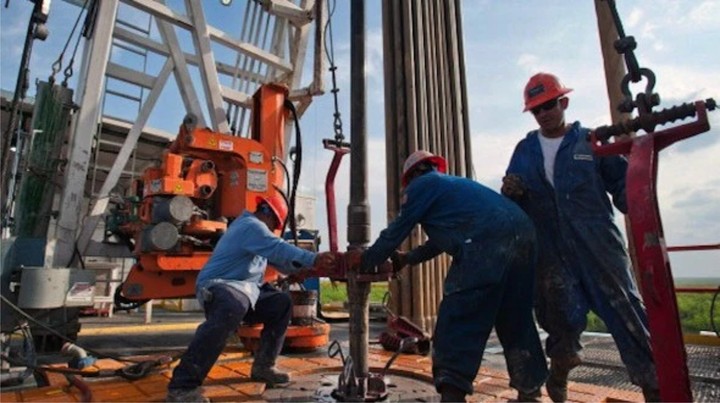News
Local Crude Producers Demand Payment In Dollars

Local crude oil producers in Nigeria are demanding to be paid with United States dollars as the currency of their operations by local refiners in Nigeria.
The producers made the demand at a meeting with the Nigerian Upstream Petroleum Regulatory Commission (NUPRC), convened to activate local domestic crude supply obligation.
Section 109 of the Petroleum Industry Act (PIA) introduces the obligation by the oil industry in Nigeria and stipulates that the supply of crude oil to the domestic market shall be on a willing supplier and willing buyer basis.
The volume of crude oil that oil-producing companies shall dedicate to the domestic crude supply obligation shall be based on an allocation system determined by the NUPRC.
Speaking at the meeting, Oluwadare Agbelese of Watersmith said: “A broader discussion needs to be held with the NMDPRA and the CBN to ensure that off-takers have priority access to forex so that they can pay for the product in a competitive manner just like the operators would if they were selling to external off-takers.”
Also raising other concerns, Tunde Akinpelu from Aiteo sought to know whether the local refiners have the flexibility on their crude oil appetite. Adding that, “Kaduna refinery does not process all the product sleeves that we have in Nigeria. So in Port Harcourt and Warri.”
Another stakeholder, Abdalla Buba talked about allowing some time for adjustment in the transition from the pre-PIA regime to the PIA regime.
Responding to the concerns raised, the Chief Executive of the NUPRC, Gbenga Komolafe, said any company that fails to respond to a request for production within a specified period is liable to pay an administrative fine of $10,000 to the NUPRC and shall not be granted an export permit.
He said the move by the commission is in a bid to ensure domestic sufficiency, adding that the nation’s inability to meet it’s domestic refining obligation has impacted negatively on the state of the economy given the numbers that are rolled out in terms of under-recovery.
Komolafe said: ‘It behooves us as an industry to find a way to make Nigeria a net exporter of refined product. It is important that we engage the industry as we are trying to implement this important provision of the PIA, which is the domestic crude oil obligation.
“The domestic crude oil obligation refers to the requirement imposed by the government on oil producers to allocate a certain portion of their crude oil production for domestic consumption. What we are trying to do in effect as a commission is to begin the enforcement of this critical provision of the PIA.
“There are now firm attempts to step up domestic refining with some modular refineries. We now also have the largest refinery in Africa, the Dangote refinery. We have received a request from the refinery to guarantee fixed stock and we believe as a nation, it will be a shame if we cannot meet the fixed stock of the refinery.”
In furtherance of the latest move, The NUPRC has written to the producers to furnish them with copies of the committed agreement for the commission to distill the available barrels that are not committed.
Speaking on the concerns around dollar payment terms, Komolafe said the law already envisages a willing buyer, willing seller situation. “The currency of purchase will either be in naira or in dollars. The parties will sit and agree to a purchase agreement and the currency of the transaction.
“We will also escalate to other stakeholders to see how domestic refiners will be able to meet their obligation.”
Speaking on the implementation mechanism, he said; “we are conscious of the fact that every refinery is configured to take a specific type. We will collate that data and factor obligation in respect to the compactable crude type.
News
Woman killed while crossing road in Anambra

The Federal Road Safety Corps (FRSC), Anambra State Sector Command, has confirmed the death of a woman in an accident at Okpoko Market on the Asaba-Onitsha Road.
The Sector Commander, Mr Adeoye Irelewuyi, who confirmed the accident to journalists in Awka on Thursday, said that the woman was hit while she was crossing the road.
He said that the accident, which occurred on Wednesday, involved a commercial tow truck with registration number XA550BMA.
“Eyewitness report reaching us indicates that the truck was towing a vehicle in an uncontrollable speed along the axis.
“The vehicle that was being towed got detached from the tow truck.
“It hit and killed a female adult, who was said to be crossing the road, while the tow truck continued its movement.
“FRSC rescue team came to the scene and took the woman to Toronto Hospital, Onitsha, where she was confirmed dead and her body deposited at the hospital’s mortuary,” he said.
While sympathising with the family of the dead, the sector commander urged motorists, especially tow truck drivers, to exercise a high level of professionalism.
He also urged the drivers to always use standard equipment and avoid speeding.
News
LASG’s maize palliative impactful, says poultry association chair

The Chairman, Poultry Association of Nigeria (PAN), Lagos State Chapter, Mr Mojeed Iyiola, said the state government’s maize palliative to members of the association made a positive impact on the sector.
Iyiola said this in an interview with the News Agency of Nigeria (NAN) on Thursday in Lagos.
“We received about 150,000 tons of maize in February from the Lagos State government as palliative to cushion the effect of high feed prices.
“The major benefit of the palliative is that it actually cushioned the cost of production for most poultry farmers in the state.
“The palliative was beneficial as it made the cost of some poultry produce, especially eggs to drop,” Iyiola said.
He noted that prior to the palliative, a crate of egg was sold between N3,500 and N3,700 at the farm gate, but after the palliative, it now sells between N3,200 and N3,400.
According to the PAN chair, retailers and middlemen who sell from N3,800 to N4,200 do that for their personal gain.
“We have urged our members to sell their eggs at reasonable prices following the receipt of the palliative from the government.
“We appreciate the Lagos State government for the palliative but we also urge the federal government to do likewise, to further reduce the cost of production in the sector.
“This will consequently lead to drop in the prices of all poultry produce across board,” he said.
He said the palliative was shared among financial members of the association at no extra cost.
“As an association we shared the grains equally across PAN’s eight zones in the state equally. We also mandated each zone not the sell even a grain of the maize.
“We, however, considered new poultry farmers who wanted to the join the association as beneficiaries of the palliative,” said Iyiola.
He noted that through the palliative, more poultry farmers were recruited into the association.
“The maize was shared only to poultry farmers and not feed millers, it is the major component of poultry feed formulation,” he said.
-

 Business6 days ago
Business6 days agoSeplat Energy celebrates a decade of Dual Listing with Bell Ringing Ceremony at Nigerian Stock Exchange
-

 News6 days ago
News6 days agoBDCs now buying dollar at ₦980 — ABCON President
-

 Metro6 days ago
Metro6 days agoOsun Poly Student, Olanrewaju Olatona killed by hit-and-run one-way driver
-

 Headline6 days ago
Headline6 days agoFagbemi warns against obstructing EFCC from performing its lawful duty
-

 News6 days ago
News6 days agoLASG’s maize palliative impactful, says poultry association chair
-

 News6 days ago
News6 days agoWoman killed while crossing road in Anambra




